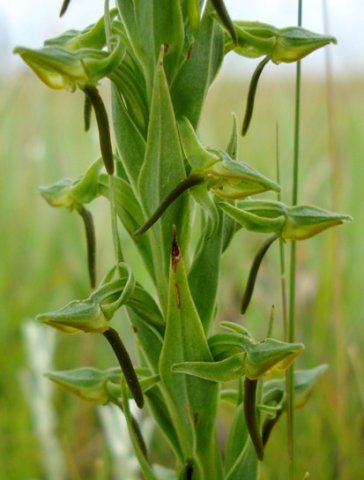Habenaria anguiceps flowers

The Habenaria anguiceps flowers in picture show their green median sepals leaning forward over the flower centre. The two lateral petals adhere to the sides of this sepal, the three segments of equal length, forming a hood. This hood, thought to resemble the head of a snake about to strike, brought about the specific name, anguiceps: anguis means snake in Latin and ceps, derived from caput means headed.
Dark green, oblong lips are hanging from these flowers conspicuously. The variously curved lateral sepals taper narrowly to their tips. The narrowly ovate to rhombic floral bracts have folds or midribs down their centres. The ovaries have ribbed surfaces and curve downwards in their upper parts ((Liltved and Johnson, 2012).

